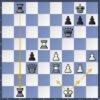MOSCOW — The chess world mourns the passing of Boris Spassky, a name synonymous with intellectual brilliance and a pivotal moment in 20th-century history. At 88, the former Soviet world champion, who on February 28, 2025, departed this life in Moscow, leaves behind a legacy defined not only by his immense talent but by his unwitting role in a global drama that extended far beyond the 64 squares of a chessboard.
A Prodigy`s Ascent: The Soviet Chess Machine`s Elegant Product
Born in Leningrad (now St. Petersburg) in 1937, Spassky emerged as a chess prodigy in a nation where chess was more than just a game; it was a cornerstone of intellectual and ideological superiority. His style was characterized by a rare universality – equally adept at sharp tactical skirmishes and subtle positional maneuvering. Unlike many Soviet grandmasters, whose play often reflected a rigid, almost scientific approach, Spassky possessed a flair, an aesthetic elegance that made his games a joy to behold. He became world champion in 1969, a culmination of years of dedicated study and triumph over formidable opponents, solidifying the Soviet Union`s dominance in the intellectual arena.
The Match of the Century: Chess as Cold War Theater
Then came 1972, and the “Match of the Century.” In Reykjavik, Iceland, Spassky, the reigning champion, faced the enigmatic American challenger, Bobby Fischer. What began as a contest of minds quickly escalated into a proxy battle of ideologies. It was the Soviet Union`s stoic, cultured representative against America`s mercurial, individualistic genius. The world watched, fascinated, as two superpowers metaphorically dueled over a checkered board.
The atmosphere was thick with Cold War tension, amplified by Fischer`s eccentric demands and psychological ploys. While Spassky, ever the gentleman, largely maintained his composure, the relentless pressure was undeniable. He was not just playing Fischer; he was playing against the weight of Soviet expectation, against the symbolic significance of the match for millions around the globe. His eventual defeat, a monumental upset, marked the first time a non-Soviet player had held the world title in decades. It was a loss that resonated far beyond the chess community, a symbolic shift in a world captivated by the strategic dance of superpowers. One could almost hear the collective sigh, or perhaps cheer, from Washington D.C., and the quiet apprehension in Moscow.
Beyond the Board: A Life of Principle and Freedom
Spassky`s journey didn`t end with the loss of his title. His character, as noted by fellow grandmasters like Garry Kasparov, always seemed to possess an independent streak, a resistance to being fully molded by the “Soviet machine.” This was perhaps most evident in his decision to emigrate to France in 1976, a move that spoke volumes about his desire for personal freedom over ideological conformity. He continued to play chess, albeit with less competitive ferocity, enjoying the game for its inherent beauty rather than as a tool for national prestige.
His adaptability, a hallmark of his playing style, also extended to his life. He was known for his kindness, his willingness to mentor younger players, and his ability to transcend the rivalries that often define elite sport. He embodied a rare grace, even in defeat, earning him respect from adversaries and admirers alike.
An Indelible Mark on the Game
The International Chess Federation rightly hailed Spassky as “one of the greatest players of all time” who “left an indelible mark on the game.” His legacy is multi-faceted: that of a brilliant, elegant player, a world champion, and crucially, a central figure in one of the most iconic sporting events ever. He navigated a geopolitical chessboard with quiet dignity, proving that even in the most intense ideological battles, the human spirit, with its complexities and desires, ultimately holds the winning move.
As the curtain falls on Boris Spassky`s extraordinary life, his story serves as a poignant reminder that while chess may be a game of logic and strategy, its greatest narratives are woven from human drama, political currents, and the timeless pursuit of excellence.











